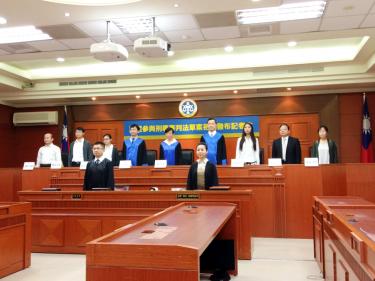The Judicial Yuan yesterday completed the first draft for a bill authorizing the public’s participation in criminal trials as so-called “citizen judges,” which received a mixed welcome from the nation’s legal professionals and judicial reform groups.
The bill, which contains 120 articles, establishes the rights and responsibilities of citizen judges on panels in criminal trials that would include professional judges.
Panels of three professional and six citizen judges would rule on criminal trials, ranging from offenses carrying a prison sentence of at least seven years to “homicide occurring in the intentional commission of a crime.”
The citizen judges would be selected at random, but they would have to be Republic of China citizens and at least 23 years old, among other qualifications.
People called to serve on the panels would receive a daily stipend and reimbursement for transportation and other expenses.
They would be forbidden from disclosing court information to the public until they have rendered a verdict or from asking for or receiving bribes in connection to their duties, or risk a prison term of less than 10 year.
The panels would require a two-thirds majority to render a guilty verdict. Should less than two-thirds agree on a guilty verdict, the panel would be required to either uphold the assumption of innocence or render a verdict in favor of the defendant.
Opening the halls of justice to the public would help educate people about the law and help the judicial system identify its shortcomings, one prosecutor said on condition of anonymity.
However, the random selection of citizen judges might result in the drafting of “rank amateurs,” a prosecutor said, adding that walking a panel through basic legal principles might add to prosecutors’ workloads.
Criminal trials could become more time-consuming, creating stress for defendants in pretrial detention and professional judges, the prosecutor said.
The bill should be seen as the Judicial Yuan’s response to the resolution of the National Congress on Judicial Reform, said lawyer Huang Di-ying (黃帝穎), deputy director of legal reform group Taiwan Forever Association.
“The bill’s conception of citizen judges is more progressive than the current judicial system, in which power is monopolized by judges, but the proposal still has room for improvement,” Huang said.
The bill would create a system that is closer to the Japanese system of lay judges than the common law system of “trial by jury” in the UK or the US, he said.
A jury system maintains a separation of powers, with jurors determining issues of fact and a judge ruling on issues of law, which is dissimilar to the Judicial Yuan’s mixed panel of citizen and professional judges, he added.
The congress voted itself into a deadlock when it tried to choose between the two systems, Huang said.
Additional reporting by Chen Wei-han
Source: Taipei Times - 2017/12/01









